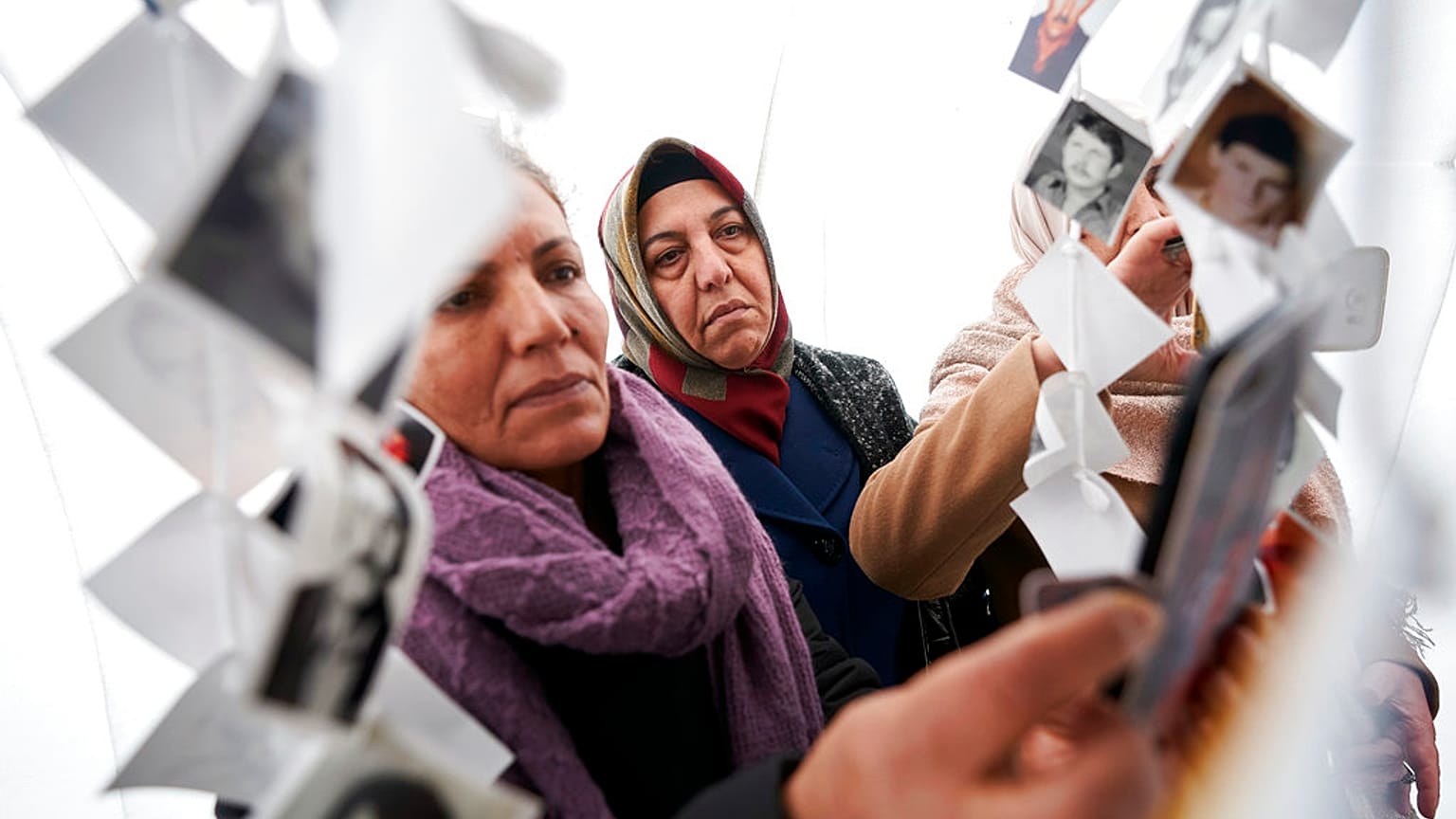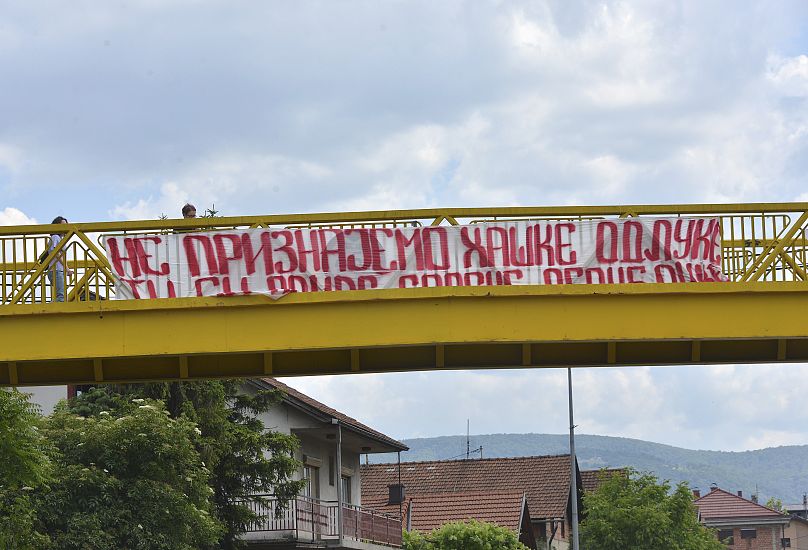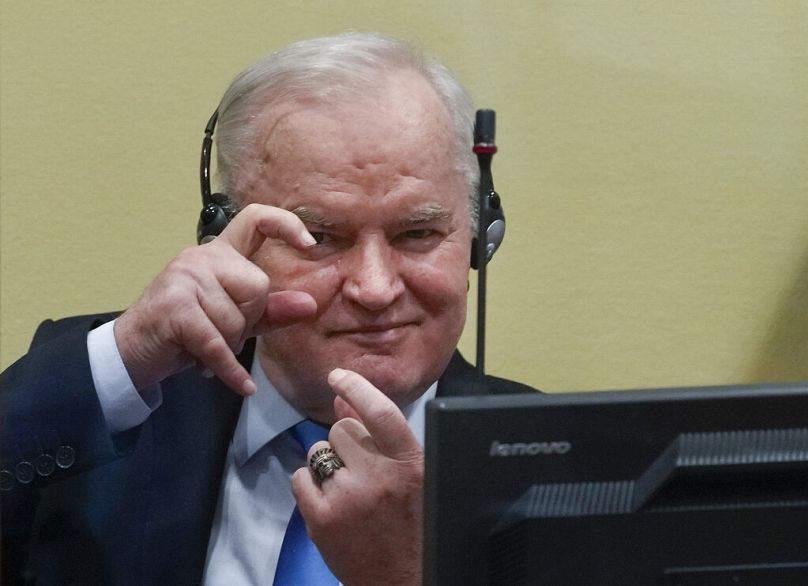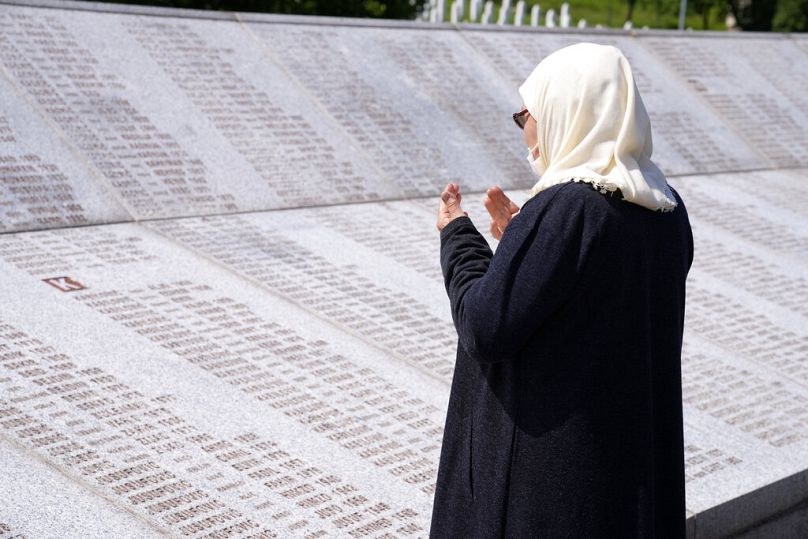Mladić was convicted for one count of genocide, the summary executions of over 8,000 people in Srebrenica, but not of another, killings at Vlasenica, Foča, Ključ, Kotor-Varoš, Prijedor, and Sanski Most.
The highly anticipated final verdict against former Bosnian Serb general Ratko Mladić -- arguably the most infamous war criminal in the Balkans -- received wall-to-wall coverage across the entire former Yugoslavia on Tuesday.
 ADVERTISEMENT
ADVERTISEMENT
 ADVERTISEMENT
ADVERTISEMENT
When the UN court that led the trial against him for ten years upheld his life sentence for turning large swathes of Bosnia into a bloodbath during the war in the 1990s, the region heaved a collective sigh of relief.
Mladić faced two separate counts of genocide and was convicted for one, the summary executions of over 8,000 people in Srebrenica in July 1995. Vlasenica, along with five other municipalities in Bosnia -- Foča, Ključ, Kotor-Varoš, Prijedor, and Sanski Most -- were part of the genocide charge he was not convicted for.
"The Sušica camp was opened on May 31, 1992. The first person killed in the camp on that day, kicked to his death," recalls Hazim Mujčinović, who is from Vlasenica, "was my uncle Mevludin."
His uncle was close friends with the man who killed him before the war. "I guess he killed my uncle, his best friend, in order to prove his belonging to the [wartime] cause."
The International Criminal Tribunal for the former Yugoslavia (ICTY) was formed during the 1992-1995 Bosnian war once it became clear that atrocities were being committed on the ground that required international arbitration in their prosecution.
It was the first tribunal in Europe since the Nuremberg trials to issue genocide indictments -- and later, verdicts -- with the lofty goal of delivering Western-style justice to the complex issues surrounding the Yugoslav conflicts.
For the survivors and families of those killed in Srebrenica, the news of the genocide verdict against Mladić -- who many remember vividly as having packed their loved ones onto trucks and lorries, never to be seen again -- being upheld meant that the world was validating the senselessness of their slaughter.
For Mujčinović, now an actor and a stand-up comedian living in Tuzla, this echoed the sense of betrayal by the international community the victims felt during the war. Many survivors feel that much more could have been done to prevent or stop the crimes at any point during a four-year war that took place on European soil.
He was 13 when his entire world fell apart.
"Vlasenica experienced ethnic cleansing in the absolute sense," he explains. "I could see the Drum and Zeban villages from my balcony. Vlasenica is situated on a hill so you can see the surrounding villages -- you could see the units lined up with the infantry upfront."
"A couple of shells would get fired and then the infantry would move in. I saw people running out of houses and getting shot. The bodies were left there to rot long after I left Vlasenica," Mujčinović remembers.
While the town was under siege, local volunteers formed death squads intent on wreaking havoc. Vlasenica was a multiethnic town whose inhabitants were of diverse backgrounds. As the war heated up, those with the weapons and military backing were mainly its ethnic Serb residents who targeted their Bosniak neighbours for their assumed Muslim faith.
"They had these vans in Vlasenica that would drive around with their doors open, and they'd pick up anyone who looked suspicious in any way — or rather, as they said at the time, who had 'the face of a Turk'," he explained. Those taken were never seen again.
The decline
After increasingly nationalist sentiments appeared in Yugoslavia with the weakening of its socialist rule, the republics that were a part of the federation started breaking off one by one, similar to what happened in the Soviet Union.
However, because the republics were not ethnically homogenous in any way -- they were, in fact, very multicultural -- the question of which ethnic group would dominate became extremely relevant.
This was particularly evident in Bosnia, arguably the most diverse and multiethnic part of former Yugoslavia. As Bosnia's neighbour and the strongest republic, Serbia felt that all ethnic Serbs needed to stay in a Serbia-dominated Yugoslavia in one way or another.
Nationalist Bosnian Serb politicians launched attacks on parts of Bosnia they felt belonged to ethnic Serbs after it became independent. Ratko Mladić led their army.
The easiest way to turn local Serbs against their neighbours was to play up the nominal religious background of the large Bosniak population, blaming Muslims for preventing the domination of Orthodox Christian Serbs. This rhetoric does not differ significantly from that of many far-right nationalists in Europe today.
After Vlasenica was deemed unsafe for the remaining Bosniaks in 1992 – "whoever was to be found in their homes will be killed," Mujčinović says they were told – his mother set off for the very same camp where his uncle was murdered, unaware of his fate at the time. But an inmate warned her at the entrance, telling her about the murders, and he and his mother decided to try to hide at home.
There, Mujčinović hid in the hatch under the floorboards, used for storing vegetables, for days on end.
"I was underneath the floorboards and laying on my back, and 50 cm from my head I could hear the soldier's boots walking up and down, and the loosened dust was falling on my head. I began shaking, and later had a nervous breakdown from the fear," he recounts.
The extent of the crimes in places like Vlasenica is so unknown to the general public that even the English-language Wikipedia entry about the town bears no mention of the crimes that occurred there, and other sources are scarce.
Places like Prijedor or Foča, which briefly became infamous due to more intense reporting by the international press or earlier ICTY rulings, are also being forgotten over time.
Thousands were killed, with many more subjected to a campaign of torture, rape, and internment intended to erase entire populations -- one way or another.
Rejecting to include the war crimes in these towns in Mladić's genocide conviction could be emotionally scarring for those whose experiences are very similar to what happened in Srebrenica, says Julian Borger, world affairs editor at the Guardian. He covered the Balkans in the past and reported on the Mladić verdict as well.
"I imagine that the people in the other six municipalities will feel forgotten and feel like second-class victims. In part, this is because the word genocide has such powerful emotive force," Borger explains.
For those who experienced such intense loss during the war, a genocide conviction is one of the few forms of consolation they experience -- especially considering that many have never found the bodies of their loved ones.
"The word genocide is so loaded, if you are not covered by it, I can imagine that if your son, daughter, husband, wife had gotten killed in these municipalities you would feel the world was treating their deaths as not as important. That must be a terrible feeling," he said.
The all-or-nothing power of a genocide conviction also works in favour of perpetrators and their supporters, making them feel vindicated or even not guilty even though Mladić's verdict confirmed ethnic cleansing and other war crimes took place.
"Crimes against humanity, murder and persecution are all terrible things. It is wrong, in logical terms, that genocide has become this be all end all," said Borger. "But it is very true in emotional terms. It has a visceral impact and importance. You can't just deny that by saying it doesn't make sense -- people feel it."
'The Butcher's Trail'
Borger is the author of "The Butcher's Trail," a book on the manhunt for Mladić. After the ICTY issued the first indictment against him in July 1995, Mladić stayed Commander of the Main Staff of the Bosnian Serb army until he was relieved of his duty in November 1996. Starting then, he was a fugitive from justice.
He spent 15 years hiding or being hidden by friends in the intelligence service and military until he was finally apprehended at the home of a relative in Serbia in 2011. The fact that he would eventually face trial for his crimes was not a given, Borger explains.
"When it came to Mladić, people were sceptical he would get arrested because the assumption -- which turned out to be correct -- was that he was being protected by the military and the BIA [Serbian intelligence service]. Many believed the Serbian deep state would survive any political change and never let him go. That turned out to be not entirely true."
Borger also says that while the court bent over backwards to support claims with evidence and prove guilt, he is not surprised that war crime apologists will continue to deny the extent of the crimes.
"It shows that you can have the most meticulous, carefully scrutinised and intensely debated court and judicial process, proving the commission of crimes beyond any doubt, and yet that to have little to no impact in the face of a political decision to follow the path of denial," he says.
"I find that profoundly depressing."
When the court was set up, many believed its practices could set a precedent for prosecuting war crimes elsewhere in the future. Yet, for Borger, the world in the 1990s was a very different place from what it is today.
"The problem is, for a court like the ICTY to have clout and meaning it can't just be the West. The ICTY and ICTR [International Criminal Tribunal for Rwanda] were set up in a brief window of time in which [former Russian President Boris] Yeltsin felt that Russia's long-term survival was bound up in the West and was willing to cut deals Putin will never cut."
"Even with the ICC, the United States has bought in and bought out again, fatally undermining it. I feel that all the gains made by the ICTY and the ICTR in terms of establishing a standard of trying to bring accountability for war crimes has been frittered away," he concludes.
Aggressive and hateful language
Activist and journalist Refik Hodžić from Prijedor, another one of the municipalities not included in the genocide conviction, believes that the court had access to enough evidence to prove the crimes "corresponded with genocidal intent".
"The crimes were committed with a narrative that shows an intention to destroy these groups — in Prijedor's concrete case, the Bosniaks and Bosnian Croats. The statements of political and military leaders at the time really clearly illustrate this intention," says Hodžić, who was also an ICTY spokesperson in the past.
Hodžić points out that the aggressive and hateful language intended to justify and condone genocide was used by the entire Bosnian Serb political top at the time.
"Radoslav Brđanin, who was the head of Bosnian Serb [SDS] party for Krajina and deputy PM, came out very clearly saying that Bosnian Muslims must not be allowed to consist of more than two per cent of the population, and if necessary, this needs to be achieved through killings. Radoslav Vukić even said that children from so-called 'mixed marriages' should be all killed off," he says.
Vukić, president of the Banjaluka chapter of SDS, visited the Omarska camp near Prijedor in July 1992.
Witnesses testifying in front of the ICTY claimed that detainees were forced to sing Serb nationalist songs in his honour.
Prijedor had a Bosniak and ethnic Croat majority before the war. Now, they are reduced to less than three or two per cent.
On the day of the verdict, hardline Serb nationalists in Prijedor saw the rejected count as cause for celebration, he says. "They shouted "no genocide", "victory" — despite the fact that the judgement shows in gruesome details the campaign of extermination that was conducted in Prijedor."
Hodžić is certain that this was the last chance for these areas to be included as part of the wider Bosnian genocide committed during the war.
After an illustrious career based abroad, Hodžić has moved back to work from Prijedor and finds it very difficult to live in an atmosphere where his family's fate and that of his hometown continues to be denied.
"My family was a very large family, yet with my mother's recent passing, there is only my aunt left [in Prijedor] from the entire family of 150 people, maybe."
The rest of the surviving family members live in far-flung places around the world, from Sweden to New Zealand. There is no coming back for them, says Hodžić. "The roots of the family have been completely cut by the crimes committed in the 1990s. And it was done with the intention for us to not live here."
The Mladić sentence will only strengthen the systematic denial that is ever-present. "On the level of ordinary life, I love my neighbours and we have a very rich and fruitful life together.
"But this topic simply cannot be addressed because they are under huge pressure from the government, the media, the church — all these powerful sources of narrative denying what we all know has taken place."
Every weekday, Uncovering Europe brings you a European story that goes beyond the headlines. Download the Euronews app to get a daily alert for this and other breaking news notifications. It's available on Apple and Android devices.

















